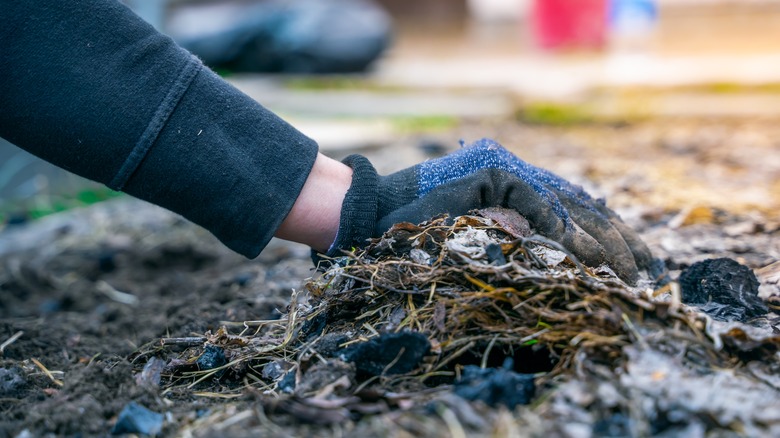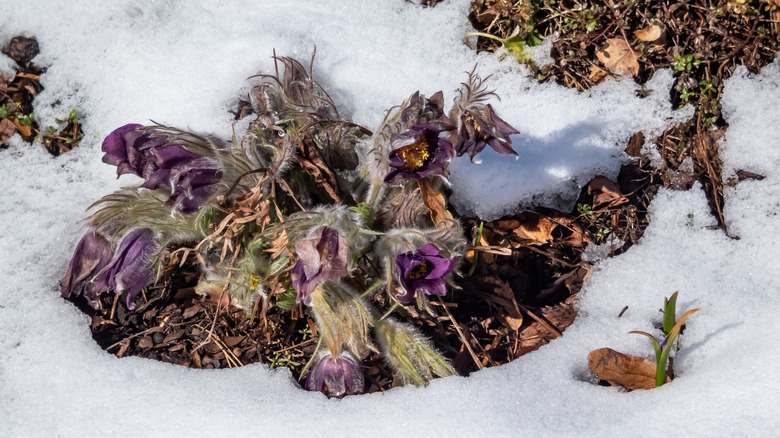The Best Way To Protect Pasque Flowers From Winter Frost For Gorgeous Spring Blooms
We may receive a commission on purchases made from links.
Pasque flowers (Pulsatilla spp., also known as Anemone spp.) are some of the best flowering perennials that can withstand frigid winters. The small, cheery early-bloomers provide some of the first bursts of color in your garden after a long winter. This U.S. native wildflower is found throughout much of the central and western half of the continent, as far north as Alaska and as far south as Texas. If you're hoping to grow stunning pasque flowers to add a splash of purple to your yard next spring, your first step is to protect the dormant plant now so it's not stunted or stressed by frost damage.
While it's a hardy perennial that can overwinter even in the extreme cold of the arctic, the small flowers can still benefit from a little protection from frost while it's dormant, especially if you're in the colder or drier parts of its range.
Adding a layer of mulch around the plants is generally the best way to protect pasque flowers from winter frost, but the amount and timing depend on your climate. It's also important to avoid adding excessive winter protection. Like other early bloomers, pasque flowers need vernalization — a period of cold exposure to stimulate flowering. If you go overboard with winter protection, you might prevent your pasque flowers from blooming next spring.
How to mulch pasque flowers for the winter
Many varieties of pasque flower are cold hardy to zone 4, but some of the arctic varieties, like wolfgangiana, can withstand the freezing temperatures in zones 1 through 3. Still, adding a 2 to 5 inch layer of mulch on top of the soil around your pasque flowers will help stabilize soil temperature and moisture levels through the winter. This way, the roots aren't exposed to continuous cycles of freezing and thawing which can cause damage or even root death.
For best results, you should apply the new mulch layer before your first frost, so you can insulate soil before it freezes. However, late mulching is still better than nothing at all. Even if soil temperatures have already dropped, you can still use mulch to protect your pasque flowers.
As winter comes to an end, be sure to remove mulch to provide light exposure and a few weeks of cold exposure to stimulate flowering. In general, species like pasque flower that require a cold period will be able to bloom well if they are exposed to temperatures ranging from 41 degrees to 46 degrees Fahrenheit for about 4 to 6 weeks before spring. So, you can keep dormant flowers heavily mulched and protected through the coldest months of winter and then thin out the mulch when average temperatures climb back into the 40s.
Other ways to protect overwintering pasque flowers
Regardless of your climate, one of the easiest ways to protect pasque flowers from frost is to delay pruning it after it dies back for the winter. While it may not look great, leaving the dead plant material intact protects the plant tissue from injury and even helps prevent the flower from putting out new growth too early. Leave the dead tops of the plants in place through the winter and wait until you see new shoots emerge in spring to trim away the old growth.
If you live in a drier area, you also might need to water the area occasionally. While the plant doesn't need water while it's dormant, dry soil freezes faster. Keeping the soil slightly moist will help it absorb and retain heat through the winter. To avoid overwatering, use a moisture sensor like the XLUX Soil Moisture Meter to periodically check the soil. When it needs water, wait for a sunny day so it can absorb as much solar radiation as possible.
For gardeners in the coldest parts of its range, you might also need to protect the plant's dormant stems and leaves above ground. You can use a burlap fabric like Burloptuous multipurpose burlap fabric or plastic sheeting like this 10 mil black plastic sheeting from Farm Plastic Supply. For a budget friendly option, you can even repurpose dirty old pillows in the garden by using the fabric cover to wrap your plants for the winter.


